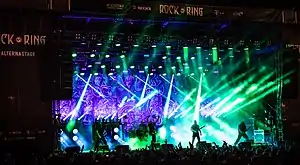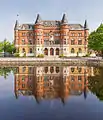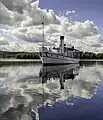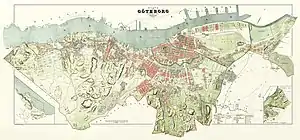Welcome to the Sweden Portal! | ||||||||||||
 |
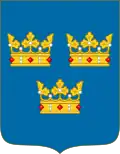 |
.svg.png.webp) | |
Sweden, formally the Kingdom of Sweden, is a Nordic country located on the Scandinavian Peninsula in Northern Europe. It borders Norway to the west and north, Finland to the east, and is connected to Denmark in the southwest by a bridge–tunnel across the Öresund.
At 450,295 square kilometres (173,860 sq mi), Sweden is the largest Nordic country and the fifth-largest country in Europe. The capital and largest city is Stockholm. Sweden has a population of 10.5 million, and a low population density of 25.5 inhabitants per square kilometre (66/sq mi), with around 87% of Swedes residing in urban areas, which cover 1.5% of the entire land area, in the central and southern half of the country. Nature in Sweden is dominated by forests and many lakes, including some of the largest in Europe. Many long rivers run from the Scandes range, primarily emptying into the northern tributaries of the Baltic Sea. It has an extensive coastline and most of the population lives near a major body of water. With the country ranging from 55°N to 69°N, the climate of Sweden is diverse due to the length of the country.
Germanic peoples have inhabited Sweden since prehistoric times, emerging into history as the Geats (Swedish: Götar) and Swedes (Svear) and constituting the sea peoples known as the Norsemen. An independent Swedish state emerged during the early 12th century. After the Black Death in the middle of the 14th century killed about a third of the Scandinavian population, the dominance of the Hanseatic League in Northern Europe threatened Scandinavia economically and politically. This led to the formation of the Scandinavian Kalmar Union in 1397, which Sweden left in 1523. When Sweden became involved in the Thirty Years' War on the Protestant side, an expansion of its territories began, forming the Swedish Empire, which remained one of the great powers of Europe until the early 18th century. (Full article...)
 Good article -
Good article -
Hour of the Wolf (Swedish: Vargtimmen, lit. 'The Wolf Hour') is a 1968 Swedish psychological horror film directed by Ingmar Bergman and starring Max von Sydow and Liv Ullmann. The story explores the disappearance of fictional painter Johan Borg (von Sydow), who lived on an island with his wife Alma (Ullmann) while plagued with frightening visions and insomnia.
Bergman originally conceived much of the story as part of an unproduced screenplay, The Cannibals, which he abandoned to make the 1966 film Persona. He took inspiration from Wolfgang Amadeus Mozart's 1791 opera The Magic Flute and E. T. A. Hoffmann's 1814 novella The Golden Pot, as well as some of his own nightmares. Principal photography took place at Hovs Hallar, Stockholm and Fårö. (Full article...)Selected article -

Sweden maintained its policy of neutrality during World War II. When the war began on 1 September 1939, the fate of Sweden was unclear. But by a combination of its geopolitical location in the Scandinavian Peninsula, realpolitik maneuvering during an unpredictable course of events, and a dedicated military build-up after 1942, Sweden kept its official neutrality status throughout the war. At the outbreak of hostilities, Sweden had held a neutral stance in international relations for more than a century, since the end of the Napoleonic Wars in 1814 and the invasion of Norway.
At the outbreak of war in September 1939, twenty European nations were neutral. Sweden was one of only nine of these nations to maintain this stance for the remainder of the war, along with Ireland, Portugal, Spain, Switzerland, and the microstates of Andorra, Liechtenstein, Vatican City, and San Marino. The Swedish Government made a few concessions, and sometimes breached the nation's neutrality in favor of both Germany and, later, the Western Allies. (Full article...)Did you know -

- ... that Lapland school founder Maria Magdalena Mathsdotter turned to Erik Viktor Almquist to improve the rights of the Sami people?
- ... that Umeå Energi set up lamps in bus shelters to avoid people getting SAD?
- ... that Sweden's medieval Läby Church was abandoned in 1890 but reopened in 1928?
General images -
 Featured article -
Featured article -
Meshuggah (/məˈʃʊɡə/) is a Swedish extreme metal band formed in Umeå in 1987. The band's current lineup consists of lead vocalist Jens Kidman, guitarists Fredrik Thordendal and Mårten Hagström, drummer Tomas Haake and bassist Dick Lövgren. Since its formation, the band has released nine studio albums, six EPs and eight music videos. Their latest studio album, Immutable, was released in April 2022 via Atomic Fire Records.
Meshuggah has become known for their innovative musical style and their complex, polymetered song structures and polyrhythms. They rose to fame as a significant act in extreme underground music, became an influence for modern metal bands, and gained a cult following. The band was labelled as one of the ten most important hard rock and heavy metal bands by Rolling Stone and as the most important band in metal by Alternative Press. In the late 2000s, the band was an inspiration for the djent subgenre. (Full article...) Featured picture -
Featured picture -
Categories
Main topics
Subdivisions: Counties of Sweden • Municipalities of Sweden • Provinces of Sweden

History: 1975 Occupation of the West German embassy • Ådalen shootings • Consolidation of Sweden • Early Swedish history • Enlightened Absolute Monarchy in Sweden • Early Vasa era • Industrialization of Sweden • Post-war Sweden • Prehistoric Sweden • Rise of Sweden as a Great Power • Suiones • Swedish Empire • Sweden after the Great Northern War • Sweden and the Winter War • Sweden during late 19th century • Sweden during World War II • Swedish allotment system • Swedish emigration to the United States • Union between Sweden and Norway
Politics: Alliance for Sweden • Constitution of Sweden • Foreign relations of Sweden • Government of Sweden • Parliament of Sweden • Riksdag • Swedish general election, 2006 • Swedish general election, 2010 • Swedish neutrality • Swedish welfare
Demographics: Education • Ethnic minorities • Languages • Religion • Subdivisions • Cities • People • Healthcare • Immigration
Culture: Cinema of Sweden • Cuisine of Sweden • Music of Sweden • Sports in Sweden • Swedish literature • Tourism in Sweden
Symbols: Flag • Coat of arms • National anthem
Things you can do
 |
Here are some tasks awaiting attention:
|
Wikipedia in Swedish
 |
There is a Swedish version of Wikipedia, the free encyclopedia. |
 |
WikiProjects
|
|
|
|
Featured and good content
Related portals
Northern Europe
Other countries
Associated Wikimedia
-
 List of all portals
List of all portals -

-

-

-

-

-

-

-

-

-
 Random portal
Random portal -
 WikiProject Portals
WikiProject Portals
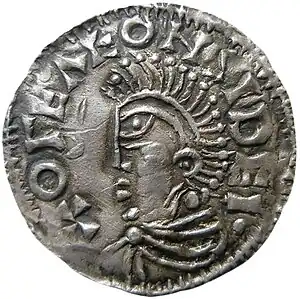
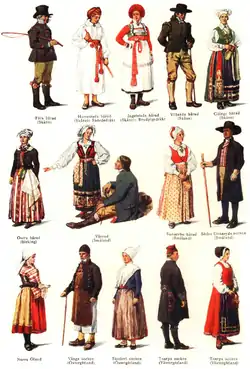
.svg.png.webp)






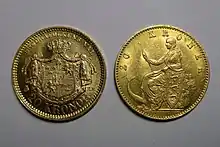

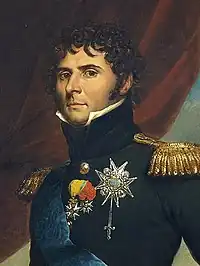



.jpg.webp)
